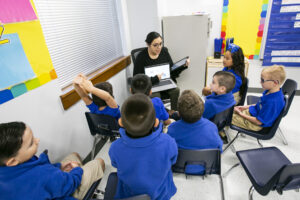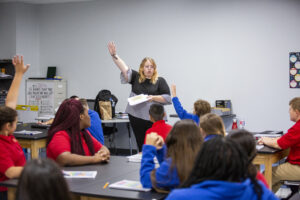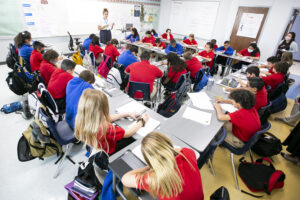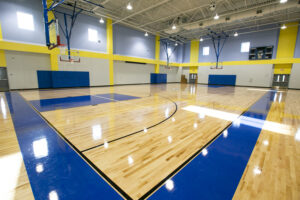IDEA Yukon has opened in Parks Bell Ranch in Odessa and the public charter school is already in full swing.
The two-story campus currently has students in kindergarten through second grade and sixth grade. Bethany Everette, principal of IDEA Academy Yukon, said they will add a grade per year.
Everette said they employ direct instruction which includes a lot of phonemic awareness.
“We actually meet them at their levels, so we test them before they get to school and they start where they’re at so that we can close those foundational gaps and get them to where they should be, which is completing the first grade program by the end of the year,” Everette said.
IDEA Yukon College Prep will have sixth through 12th grade. The principal is Craig Gutierrez.

Students, or scholars, sit college ready, giving their full attention to the lesson, the teacher, or the student speaking.
Everette offers immediate feedback, or real-time coaching, to classroom teachers.
“… We don’t wait until the lesson is over, or until a week goes by, or semester goes by to give teachers feedback. It’s like sports, right? Great athletes get feedback right in the moment and then they implement it right away and so you saw Bethany give quick feedback to implement part of our system for behavior management. That’s something you’ll see constantly and Bethany and Craig are both excellent at it,” Executive Director of IDEA Permian Basin Bethany Solis said.
The school has a positive behavior point system where when all the students are answering in response and/or college ready during their lessons, they get a point, Everette said.
“So every time they have a certain number of points, they get to do a cheer,” Everette said.
Solis said it’s a friendly competition between the teacher and the student.
Everette said the goal is for students to win.
Solis said students love it.
“So like, for example, if they’re silly things like Fantastic. You pull out your spray bottle you go, ‘You’re fantastic,'” Everette said.

Teachers undergo two weeks of professional development prior to school opening.
“We do have New to IDEA Institute, where they learn basic teacher moves that are successful and then campus specific PD where we prep them for culture camp. Kids go through culture camp, which is the first three days … where they learn how to sit like a college-ready scholar, how to walk in the halls, bubbles and wings; things like that they’re seeing …,” Everette said.
She added that IDEA has high expectations for its students.
“Because when we have high expectations and that structure, they’re able to flourish with the instruction that they’re given,” Everette said. “… There are minimal distractions to keep them from closing those gaps that we know we need to close.”
Everette said they are trying to teach scholars how to walk properly in a hallway, how to treat others kindly and how to have discussions with each other, for example. Scholars also are taught to speak in complete sentences.
“I think we’re just trying to set them up for success, so that they are able to be successful with our expectations. So if we didn’t teach them these expectations, they would come in and just walk all over the hallways and just shout out during class, which would be much harder to get them focused and doing the incredible gains that we want them — and they need to accomplish so they can be reading at grade level,” Everette said.
Solis noted that children want to behave well.
“And when they don’t, it’s usually because they just haven’t been taught to, or expected to. And so we believe that any child can learn at really, really high levels. But in order to do that, we’ve only got a short amount of time with them every day, we’re going to maximize every minute to pull out their absolute potential that we know every one of them has,” Solis said. “… It’s part of the magic of IDEA. It’s part of why our schools typically outperform others, because we have figured out some ways to pull out the absolute best academically from our students that could happen in any other school because it’s the same kids,” Solis added.
She added that the majority of the scholars are low-income, but still very socioeconomically diverse.
Solis said more than 80% of the students there live more than five miles from campus and they come from all over the city of Odessa.
IDEA was going to partner with Ector County ISD. It didn’t work out, but Solis said it could happen in the future.
“In the last minute, our two boards weren’t able to come to consensus on a couple of final negotiations,” Solis said.
Part of that partnership was going to include busing, so Solis said they were able to get some from other IDEA regions.
She noted that a misconception about IDEA is that you can’t attend if you have any learning disabilities or special education needs.
“We serve students with very profound needs and are really proud to do so,” Solis said.
Now that the campus is open, Gutierrez said he is thrilled.

“Just positive energy. Of course, there are challenges, but it’s just wonderful to be here and working with families and finding the best solutions for our scholars,” Gutierrez said.
Everette agreed.
“It’s just exciting to see the kids every morning. They’re super happy to be here and then when they leave, they’re saying goodbye to our teachers. We’ll see you tomorrow. I’m just really excited and pumped for all the growth we’re going to make for our scholars. But also that they’re having fun, and they really feel like this is their second home, so I’m excited for that,” Everette said.
All together, the campuses have a little under 500 students. There are about 30 students per class and two adults in classrooms with younger scholars and teachers in classrooms with older scholars are trained to manage large classrooms successfully.
“And what’s great about larger classrooms is that we’ve got more kids benefiting from a great teacher,” Everette said. “But yet you have to be able to equip that teacher to handle those large numbers, which we’ve, for the most part, been really successful at.”
Gutierrez said they have a school counselor and a social worker on campus.
The campus will offer Spanish and French. Gutierrez is fluent in French.
“For students that want to learn another foreign language, we’ll connect them with virtual AP classes; things like that to make sure that they still have options even if we’re not offering a full class,” Solis said.

They have after-school programs on a sports and non-sports track.
“… That’s how we’re launching because we’re small right now. But as we grow, absolutely we’re looking at more sports after school. This year, we’re starting with soccer and basketball and then going on in our non-sports track we’re looking at like STEM club” and one of the teachers wants to start Student Council, Gutierrez said.
Solis said they listen to students about what they want.
“… There’s one IDEA school that offers like over 20 UIL sports, because that’s what that campus in that community was really looking for. And then you’ll see others with a huge STEM focus or art focus. You’ll see some schools with mariachi groups or orchestras. The benefit of starting small and growing is we get to learn what our kids are most passionate about and then go in those directions,” Solis said.
Related
"Idea" - Google News
August 29, 2021 at 04:30PM
https://ift.tt/3sXVjdm
Starting small, IDEA has big plans - Odessa American
"Idea" - Google News
https://ift.tt/2VWDFI5
https://ift.tt/3d3vX4n
Bagikan Berita Ini














0 Response to "Starting small, IDEA has big plans - Odessa American"
Post a Comment